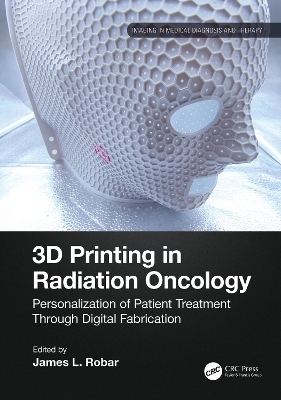
3D Printing in Radiation Oncology
CRC Press (Verlag)
978-1-032-26195-9 (ISBN)
3D Printing in Radiation Oncology: Personalization of Patient Treatment Through Digital Fabrication presents a comprehensive and practical view of the many forms in which 3D printing is being integrated into radiation oncology practice. Radiation oncology employs among the most sophisticated digital technologies in medicine. Until recently, however, the “last mile” of treatment has required manually produced or generic devices for patient set up, positioning, control of surface dose, and delivery of brachytherapy treatment. 3D printing is already offering enhancements in both precision and efficiency through the digital design and fabrication of patient photon and electron bolus, customized surface and gynecological brachytherapy applicators, proton beam compensators and range shifters, patient immobilization, novel radiation detectors, and phantoms. Various innovations are disrupting decades-old practices in radiation therapy (RT) facilities, resulting in vital improvements in personalization of treatment and patient experience.
An essential read for radiation oncologists, medical physicists, radiation therapists, oncology nurses, hospital administrators, engineers, and medical educators, this book is an indispensable resource for those bringing 3D printing to the RT clinic, looking to expand the role of 3D printing in their practice, or embarking upon related research and development.
James L. Robar, PhD, FCCPM is a globally recognized medical physicist, the Chief of Medical Physics at Nova Scotia Health, a professor of radiation oncology at Dalhousie University and a specialist in the high technology of radiotherapy— a treatment technique used for roughly half of all patients with cancer. He is also co-founder and CSO at Adaptiiv Medical Technologies, a medical-tech firm in Halifax, with the mission of improving the accuracy of cancer treatment. As a scientist, inventor, and entrepreneur, Dr. Robar has pioneered multiple advancements improving imaging and treatment delivery for radiotherapy. These technologies include enhanced imaging to improve the accuracy of targeting tumors with radiation, hardware and software detecting submillimeter motion of patients to improve the precision of treatment, planning algorithms to provide improved sparing of healthy tissues and organs, and turnkey solutions allowing intelligent design of 3D printed, patient-specific accessories used during radiotherapy. For his contributions in this field, he became a Canadian Governor General’s Innovation Laureate in 2021.
Chapter 1 Introduction and Clinical Perspective
Chapter 2 A brief introduction to 3D printing
Chapter 3 Biocompatibility and sterilization of 3D printed radiation therapy devices
Chapter 4 3D printing for external beam photon therapy
Chapter 5 3D printing for electron therapy
Chapter 6 3D printing for proton therapy
Chapter 7 Applications on brachytherapy
Chapter 8 3D printed patient immobilization
Chapter 9 3D printed radiation detectors
Chapter 10 3D printed phantoms in RT
Chapter 11 Operationalizing 3D printing in the radiation oncology department
Index
| Erscheinungsdatum | 13.06.2024 |
|---|---|
| Reihe/Serie | Imaging in Medical Diagnosis and Therapy |
| Zusatzinfo | 10 Tables, black and white; 16 Line drawings, color; 41 Line drawings, black and white; 9 Halftones, color; 64 Halftones, black and white; 25 Illustrations, color; 105 Illustrations, black and white |
| Verlagsort | London |
| Sprache | englisch |
| Maße | 178 x 254 mm |
| Gewicht | 453 g |
| Themenwelt | Medizin / Pharmazie ► Allgemeines / Lexika |
| Medizin / Pharmazie ► Medizinische Fachgebiete ► Onkologie | |
| Medizinische Fachgebiete ► Radiologie / Bildgebende Verfahren ► Radiologie | |
| Naturwissenschaften ► Biologie | |
| Technik ► Umwelttechnik / Biotechnologie | |
| ISBN-10 | 1-032-26195-1 / 1032261951 |
| ISBN-13 | 978-1-032-26195-9 / 9781032261959 |
| Zustand | Neuware |
| Informationen gemäß Produktsicherheitsverordnung (GPSR) | |
| Haben Sie eine Frage zum Produkt? |
aus dem Bereich


